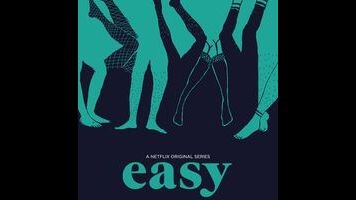Easy faces up to some hard truths

It’s tempting to describe Joe Swanberg’s Easy as a series of reflections on modern love or life in a big city. The new comedy has, after all, set up residence at Netflix alongside the similarly themed Master Of None and Love. Several of the usual markers are there, including dating apps and plenty of well-lit skin—there’s no getting it on in the dark for these fresh faces. But just like its Netflix neighbors, Easy’s more difficult to pin down. These same elements also make up Swanberg’s MO as a director, right down to the loosely structured interactions between the players. Swanberg’s touched on these themes in his films for years, from Hannah Takes The Stairs and Drinking Buddies to Digging For Fire. Here he’s transplanted them into eight tales of varying tidiness and resonance, which feel both timeless and of the moment.
The anthology format and reduced runtime lend themselves well to Swanberg’s approach. The Happy Christmas director is known for letting actors improvise their dialogue—under some advisement—which occasionally results in his work feeling like it’s petered out rather than organically reached some kind of conclusion. But with episodes clocking in at 22 to 25 minutes, there isn’t much momentum (or interest) lost. The dialogue’s naturalistic, whether it’s coming from Swanberg film vets Jane Adams and Orlando Bloom or fresh recruits Marc Maron and Kate Micucci. Most of the concepts Easy dabbles in shouldn’t be foreign to any of its players, as even beautiful, successful people can wonder if they haven’t missed out on something. As such, actors without an improv background are able to keep up when someone like T.J. Jagodowski shows up to tell you why you’re not getting laid.
That isn’t to say that all episodes of Easy are made equal. Michael Chernus and Elizabeth Reaser as a married couple trying to reignite their spark generate far more heat than Bloom and Malin Akerman do as new parents trying to squeeze in a threesome between late-night and early-morning feedings. The premise of the first episode gives Chernus and Reaser more to play with—while pushing for greater physical intimacy, they both experience a bit of an emotional shutdown. Maybe it’s that compartmentalization that’s to blame for their lack of sex, and not their “nontraditional” gender roles at home. But, title aside, Swanberg and his collaborators aren’t looking to wrap things up neatly. The matter remains unresolved, even after a literal climax.
Elsewhere, the characters of the modern fairy tale “Vegan Cinderella” are caught up in the first blush of romance. Kiersey Clemons and Jacqueline Toboni (who’s appeared on Grimm) are young lovers hoping to make the most out of their intense physical connection. Clemons plays a grad student who’s the more impressionable of the two, making valiant attempts to adopt her activist girlfriend’s vegan lifestyle. It’s not the easiest thing to commit to, as wild as she is about her new lover. This desire for self-improvement is a preexisting one and is not limited to Clemons’ character. Likewise, everyone shares the need for validation of this quest for personal development. It should matter that they want to do better, in and out of their personal lives.
There are plenty of contemporary touches in Easy, but it’s this struggle that even a progressive person has in keeping up with shifting political landscapes that drives the “Vegan Cinderella” story. Clemons’ character is too young to see it, but the gap between the people we want to be and the people we really are is never really closed. Our goals and needs change, as do our circumstances. Swanberg also explores the divide between “who we say we are and who we really are,” now that we can opt to share only our pithiest thoughts and most flattering photos.
That’s where Marc Maron and Emily Ratajkowski enter the story to argue the merits of their artwork. They play well off of each other, as Maron’s graphic novelist warms to the praise from Ratajkowski’s grad student. At first, he’s more than happy to discuss the limits of his own work and his anxiety over his diminished relevance. The new-media artist briefly serves as his muse, like so many other women he’s met. But unlike the rest, she takes control of the narrative after their brief sexual encounter. Suddenly, the memoirist is in a position to empathize with his exes, whom he’d previously gotten over by turning them into illustrated literature. There’s also a culture clash, as the graphic novelist initially refuses to consider that rampant self-portraiture is anything like him filling each of his panels with his own likeness.
Ratajkowski’s insightful observations cut through Maron’s monologues, but there’s no clear winner, of course. There are no buttons here so much as pins in a discussion. Swanberg’s modular approach to storytelling offers one of the few true snacking options among Netflix’s binging fare, which is almost as satisfying.